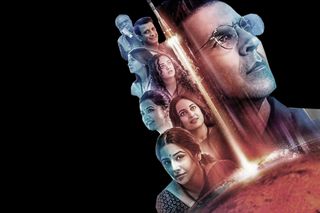
‘Mission Mangal’ Infantilizes ISRO’s Women By Over‑Simplifying Science
The only glimpses of female brilliance happen during home-making moments.

In a climactic scene toward the end of Mission Mangal — the love letter to India’s 2014 Mars satellite mission — the scientists suddenly lose connection to the satellite they have to maneuver in space, and are stumped at how to solve the problem. Kritika Aggarwal (Taapsee Pannu), a scientist on the team, comes to the rescue — she pulls a giant-looking lever and shuts down the entire operation, making the screens go black. Earlier in the movie, she’s seen berating a computer that had frozen, when her husband comes in and tells her to simply … shut the computer off, and then on. Applying similar logic, she does that to the Indian Space Research Organization’s first ever, history-making Mars mission — and it works. To which, her boss, Rakesh Dhawan (Akshay Kumar) proudly exclaims at her: “You’re a genius.”
The Jagan Shakti-directed ode to India and all the vague ideas the country stands for (such as Mahatma Gandhi, jugaad, cricket, and a seemingly crippling incapability to understand complex scientific phenomena), is in most part led by the fervently patriotic Kumar and the resourceful Tara Shinde (Vidya Balan). The rest of the team, mostly women, have Pannu-like moments — a (anti-climactic) brainwave or two, a few personal details thrown in, and an ambiguous job description.
Herein lies a theme carefully woven through the Independence Day release — Mission Mangal filmmakers are very proud to have included women characters — so much so, that they forgot to make them scientists. The movie has been marketed as a women-centric film, despite an earlier controversy-inducing poster that shows Akshay Kumar’s blown up face, taller than a stack of the women’s faces put together. Even though the filmmakers included FIVE whole women characters loosely modeled on actual ISRO scientists, their family backstories are given more screen time than their important contributions to space research.
Pannu’s character is an army wife who can’t drive; Eka Gandhi (Sonakshi Sinha) is a cigarette smoker who wants to work for NASA and likes to sleep around; Varsha Gowda (Nithya Menen) knows how to fit big things in small spaces and cannot have a child; Neha Siddiqui (Kirti Kulhari) is a Muslim woman who got cheated on by her ex-husband and cannot get an apartment.
Balan’s character, perhaps the most fleshed out in Mission Mangal, is an efficient homemaker with excellent parenting skills and a resourceful mind that often makes connections between cooking puris, playing with yoyos, and a satellite’s trajectory in space. The film often pays homage to ‘home science,’ from which Balan seems to get all of her ideas … to implement to her job in rocket science — and not once does the writing for the character (which is arguably the most nuanced) ever let her exist as simply a scientist. Filmmakers feel a need to have her get inspiration from her home at all times, as if trying to convince the audience she’s always juggling two worlds, lest we forget the constant reminders that manifest in the form of her misogynistic husband. As for the rest of the women, even the two-hour-13 minute-long run time is not enough to figure out what they do on the project, despite several passionate proclamations of them being ‘scientists.’
Related on The Swaddle:
Despite Education Gains, STEM Women in India Still Face Unequal Gains
Mission Mangal has been rightly criticized as having simplified space science to a comical degree; the film relies on ‘women empowerment’ tropes, as Bollywood understands it, peppered into a heavy dollop of patriotism. One of Balan’s first scenes is a close-up shot of her changing a gear, so we know she can drive. They also call the project the Mars Orbiter Mission, or MOM, to set up for this gem of a line, “Good we called it MOM. If we had called it DAD, the satellite would be nowhere around Mars.”
Throughout the film, we see the women, Balan more so than others, taking charge — but the simplification of science in Mission Mangal infantilizes the women, and reduces what really was a feat worth applauding in Indian history to a bunch of rebel researchers playing hooky from their actual lives and pretending to be scientists.
What this hurts most are the actual women the film claims to represent and champion. Yes, representation is important, and the film industry seems to be arriving at a point where we agree women should have equal representation on screen and off. Now that the basic requirement is fulfilled, it’s time to look at what kind of representation women are getting — the quality, the depth, the authenticity of it. Plugging in women characters in a film to make it ‘inspirational,’ without giving them the depth they as actresses and as characters deserve, is doing an injustice to both the scientists’ memory, and to the careers of these actors.
Mission Mangal also shows the degree to which filmmakers have adopted performative feminism — a Chak De India-esque scene shows the women beating up some hooligans in the metro, which does not erase the condoned sexual harassment or objectification Sinha’s character is forced to handle throughout the film. An end victory walk sequence with the women parading in front of the men does not excuse the male savior character arc that Kumar enjoys. His character is replete with personality quirks that gives the audience an idea of the kind of scientist he is: Kumar’s character remains calm under pressure, knows his space history, can effectively manage a team, goes to conferences to secure funding. This courtesy is not extended to his women colleagues, who, during Kumar’s trips, are seen cleaning a decrepit office space with brooms.
In 2014, India became the first-ever country to put a satellite in Mars’ orbit in its maiden attempt, and the first in Asia to have accomplished the feat, ever. Women involved in the original MOM, such as Ritu Karidhal, Minal Rohit and Nandini Harinath, showed the country women can be scientists, and damned good ones at that. Any homage to them cannot simply celebrate their existence; it needs to exalt their brilliance, in excruciating, glorifying detail. Mission Mangal is not that homage; not by a long shot.
Rajvi Desai is The Swaddle's Culture Editor. After graduating from NYU as a Journalism and Politics major, she covered breaking news and politics in New York City, and dabbled in design and entertainment journalism. Back in the homeland, she's interested in tackling beauty, sports, politics and human rights in her gender-focused writing, while also co-managing The Swaddle Team's podcast, Respectfully Disagree.
Related


Is This Normal? “I Can’t Stand the Sound of My Voice”
